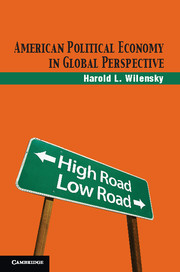Preface and Introduction
Published online by Cambridge University Press: 05 June 2012
Summary
Preface and Introduction
One should really never say, “the state does this or that.” It is always important to recognize who or whose interest it is that sets the machine of the state in motion and speaks through it.
Joseph Schumpeter (1918)Practical men, who believe themselves to be quite exempt from any intellectual influences, are usually the slaves of some defunct economist. Soon or late, it is ideas, not vested interests, which are dangerous for good or evil.
John Maynard Keynes (1936)“Globalization” has become the all-purpose cause of our troubles and opportunities. Among the basic questions about its impact on public policy and human welfare, two are of great interest to both scholars and policy makers:
Is the nation-state eroding as a unit of social-science analysis and as the center of political action?
Do capital and labor flows across national boundaries threaten the social and labor policies of the rich democracies – especially job protection and good earnings and welfare-state benefits, such as government-guaranteed universal pensions and health insurance?
Because these questions assume that globalization gives countries with low labor costs and lean social policies a competitive advantage over their rivals, we must give an estimate regarding a third question:
Leaving aside the net contribution of the welfare state and labor policies to such values as dignity, security, equality, family well-being, social integration, and political legitimacy, what are the net effects of the welfare state, social policies, and job protection on productivity and economic performance?
- Type
- Chapter
- Information
- American Political Economy in Global Perspective , pp. xi - xxiiPublisher: Cambridge University PressPrint publication year: 2012

